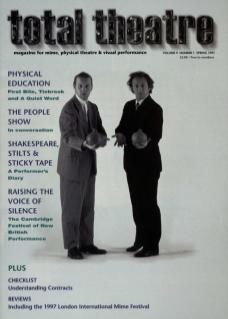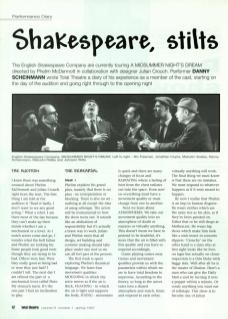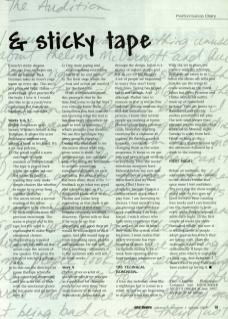The Audition
I knew there was something unusual about Phelim McDermott and Julian Crouch right from the start. The first thing I am told at the audition is “Read it badly, I don't want to see any good acting." What a relief. I am there most of the day because they can't make up their minds whether I am a mechanical or a lover. As I watch actors come and go, I wonder what the hell Julian and Phelim are looking for. Some people look good even though they are trying to be bad. Others were bad. Were they really good at being bad or were they just bad? I couldn't tell. The next day I am offered the part of a mechanical lover called Flute. My stomach turns. It's the one part I had no inclination to play.
The Rehearsal
Week 1
Phelim explains his grand plan, namely that there is no plan – no interpretation or blocking. There is also no set – nothing at all except the idea of using sellotape. The actors will be instrumental in how the show turns out. It sounds like an abdication of responsibility but it's actually a brave way to work. Julian and Phelim insist that all design, set building and costume making should take place under one roof so we can all feel part of the process.
The first week is spent exploring Phelim's theatrical language. We learn four movement qualities: Moulding in which the actor moves as if the air is thick, Floating – in which the air is light and supports the body, Flying – movement is quick and there are many changes of focus and Radiating where a feeling of heat from the chest radiates out into the space. From now on everything must have a movement quality or must change from one to another.
Next we learn about Atmospheres. We take our movement quality into an atmosphere of doubt or reunion or virtually anything. This doesn't mean we have to pretend to be doubtful, it's more that the air is filled with this quality and you have to respond accordingly.
Game playing comes next. Games and movement qualities provide us with the parameters within which we are to have total freedom to improvise. According to the theory, so long as the actors enter into a shared atmosphere and watch, listen and respond to each other, virtually anything will work. The final thing we must know is that there are no mistakes. We must respond to whatever happens as if it were meant to happen.
By now I realise that Phelim is an imp in human disguise. He wears clothes which are the same size as his skin, as if they've been painted on. Either that or he still shops at Mothercare. He wears big shoes which make him look like a stick insect in concrete slippers. 'Crouchy' on the other hand is a man who at first sight looks like he lives on lager but actually on closer inspection is a thin bloke with baggy skin. Well after all he is the master of illusion. Here's a man who can give the Daily Mail a soul by turning it into a puppet within a minute. Or create anything you want out of sellotape. This show is to become one of Julian Crouch's sticky dreams.
On day four we begin our warm up routine. Nick Freeman takes an hour's yoga warm up every day. This ain't just plain old yoga, this is power yoga. Knot practice for the body. I love it. I would also like to do a vocal/verse equivalent but that never happens. A big oversight.
Weeks 2 & 3
Phelim introduces us to Jeremy Whelan's Instant Acting Technique. It allows the actor to rehearse without ever having a book in his hand. It's a six step process:
1) The actors record a scene onto tape, without emotion or interpretation. The tape is played back whilst the actors 'act out’ the scene. In the first reading they only make simple choices like whether to move to or away from another character.
2) The actors record a second reading of the scene allowing it to be affected by their impulses from the previous enactment. The scene is played out to the tape but the actor is encouraged to make bigger emotional choices.
3) The process is repeated again but this time all the actors copy the actions of the speaker. This gives the effect of watching a shoal of fish.
4) In this run the director can pause the tape when he sees something interesting and the actor has to stick with the emotional choice he has made and go further with it.
5) One more taping and enacting using everything learnt so far and more.
6) The final stage where the text and action are married for the first time.
What is remarkable about this process is that by the time you come to do the lines you virtually know them. Quite often you find yourself not knowing what the text is but your body remembers to turn to look at someone, which prompts your memory. We use this technique for every scene in the play. During this time there is no discussion about what any given scene is about. No interpretation, just constant play. I try using the technique to achieve something completely different on each recording. But once a scene has been done, there is no feedback as to what was good and what was bad, so it's difficult to know what works. Phelim and Julian keep reminding us that there is no good or bad at this stage, because rehearsals are about discovery. Phelim tells us that if he were to say that something was good then we would be encouraged to do it again. And this would stop us from remaining open, playful and inventive. He will not block anything – ultimately it is the audience who will tell us what works.
Week 4
Phelim gives us a list of questions which we may use as a guideline for character work in our own time. They seem mainly to be based on Stanislavski. Julian takes us through the design. Julian is a master of instant design and has an eye for big imagery. A lot of people are beginning to worry they don't know their lines. Taping has helped, but is not enough. And although Phelim tries to reassure us that it will be fine and that private work on the text will undermine the process, I know that several people are working at home. Phelim is now using emotion cards, randomly selecting emotions for a character to explore. He flashes a card at someone, constantly changing them as the scene progresses. It keeps us on our toes and never lets us settle into anything. Over the weeks wondrous moments have flickered before my eyes and vanished before I could pin them down and try them again. I feel I have no character, because Flute is a different man every time I play him. I am drowning in choices. I find myself trying pre-planned ideas and for a week everything I do feels forced. I watch others who have more experience than me and am in awe of how they make the system work for them. I soon realise that nearly everyone has their moment of panic. It's a vertiginous feeling to be a week from opening and to have nothing whatsoever set.
The Technical Rehearsal
A four-day tech may seem like a nightmare but it comes as a relief. At last we are beginning to discover what this show is.
With the set in place, we practice with the sellotape. Decisions are taken as to when the fairies use stilts and how we use the wings to create animals in the forest. Julian has given Pyramus and Thisbe wonderful outfits made up of household basketry. They are funny in themselves and provide endless possibilities for play. The tech takes longer than planned and we skip our dress rehearsal on Monday night. Tuesday is a day from hell. Finish teching in the morning, a dress rehearsal in the afternoon followed by a show in the evening.
First Night
Before an audience, the adrenaline makes me commit to the choices I make and once more I feel confident. The next day the show works really well. As this goes to press we have been running four weeks and I can honestly say the show really is fresh every night. People respond anew each night. In the first couple of weeks the show fluctuated wildly, but now it is settling down as people adopt approaches which they are happy with. Does the technique work? Well undoubtedly it keeps the show alive which is useful for a long run. And as for me, I didn't want to play Flute and have ended up loving it.


